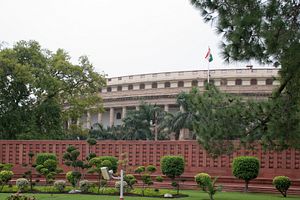Fulfilling predictions from earlier this summer, India’s Congress Party was officially denied leadership of the opposition in parliament. Sumitra Mahajan, speaker of the Lok Sabha, conveyed the decision in writing to Congress Party President Sonia Gandhi. According to Mahajan, the decision was made with India’s Attorney General Mukul Rohatgi and enforces the “rules and tradition” of the Indian parliament, which state that a party in opposition must have at least 55 seats within the Lok Sabha to rightfully gain claim the mantle of the opposition leader. The Congress Party won just 44 seats in May’s election, rendering it unable to qualify to lead the opposition. The decision is a major blow to the Congress Party, which has historically been a major force in Indian politics. More importantly, the lack of an opposition leader will significantly strengthen the Bharatiya Janata Party’s (BJP) ability to govern unfettered by a robust opposition.
While Congress alone won just 44 Lok Sabha seats, with its allies in the United Progress Alliance coalition, it met the required 55 benchmark. Prior to Mahajan’s decision, Congress petitioned to lead the opposition with the signatures of over 60 legislators. The speaker’s rebuttal, however, asserted that in order to lead the opposition, a party must field 55 of its own members. Presumably, allowing for coalitions to lead the opposition could lead to patchwork alliances of regional parties. Further damaging the Congress Party bid to lead the opposition was the reluctance of two particularly strong regional parties — the South India-based All India Anna Dravida Munnetra Khazagam (37 seats) and the West Bengal-based All India Trinamool Congress (34 seats) — to cooperate with the Congress. Controversy over who would come to lead the opposition has thus been brewing for weeks.
The absence of an opposition leader has several important political implications for the current government in New Delhi — a government formed by a party holding a super-majority in the Lok Sabha. As data suggests, this BJP government should be able to pass new laws with relatively little hassle. The legislative environment in India hasn’t been as favorable for a government since the 1980s. In particular, this Lok Sabha is remarkably concentrated in the hands of the BJP-led National Democratic Alliance (NDA) coalition (the effective number of parties in the Lok Sabha is down at its lowest since 1996, at just 3.5). In practical terms, the opposition leaders of both the Lok Sabha and Rajya Sabha (the upper house of India’s bicameral legislature) are afforded cabinet-level posts within the government and consult with the prime minister on important appointments. Those posts will remain vacant now.
The Congress’ spectacular loss to Narendra Modi and the BJP has sparked some important soul-searching for India’s oldest political party — the party that led India to independence under Jawaharlal Nehru. The Congress was unable to snap back from its second consecutive term in power when it grew increasingly burdened by corruption scandals, poor economic performance, and political lethargy. The party, which has effectively been a family business under the Nehru-Gandhi name, does not have the kind of charismatic leader it needs to help it out of its current rut. Rahul Gandhi is a reluctant leader, described by some as “another miserable son trapped in the family business.”
The Congress Party has never been as absent from Indian politics as it likely will be during this 16th Lok Sabha. While it was first unable to lead India, it is now unable to lead the opposition.

































